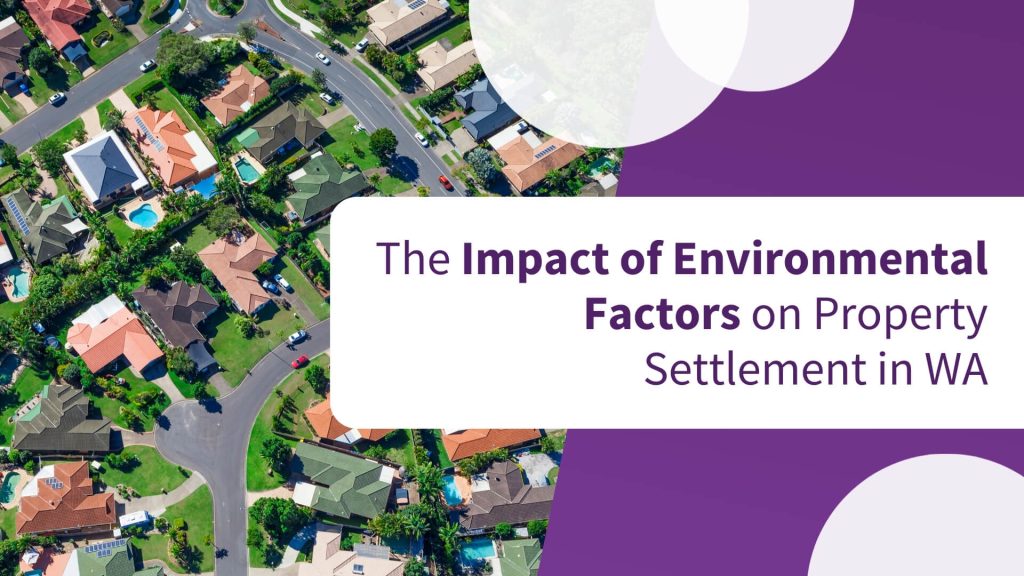The Impact of Environmental Factors on Property Settlement in WA

For property purchases and sales, the focus is usually on title checks, reviewing the contract of sale, finances and inspections. Environmental factors, such as climate change, land issues or hazards, can easily be overlooked during residential and commercial property settlements.
Examples include contaminated soil, flood and bush-fire zones, and hazardous material, all of which can affect insurance costs, future property value, saleability and investment potential.
Meanwhile, predicted climate change and extreme weather events are set to impact property prices and insurance costs.
Conducting the necessary assessments for these potential risks, ensuring transparency, and addressing them promptly can help avoid settlement delays, costs, and legal obligations post-settlement.
This is where the services of KDD Conveyancing Services can be of great benefit, for peace of mind, and for a smooth settlement and beyond.
Environmental Factors That Can Affect Residential Settlements
Purchasing a property means inheriting all its associated benefits and responsibilities, so it’s important to identify its environmental risks before settlement. Meanwhile, sellers need to ensure compliance with environmental regulations and disclosure of environmental concerns to avoid fines.
Climate-related Events
The impact of climate change and its related events can translate to costly repairs and maintenance, adverse effects on future saleability and appeal of a property, market devaluation and higher insurance premiums.
The Climate Council reports that one in 23 properties across Australia is already at high climate risk. Climate risk assessments may become just as important as building and pest inspection reports, with a further one million homes estimated to become classified high risk by 2050, according to Climate Valuation. The organisation introduced a new tool, the Property Risk Portal, which can assess a property’s climate risk and the cost of potential damage. The Climate Council’s interactive Climate Risk Map also shows the potential damage risk to properties in a particular area.
Climate Valuation reveals that technical insurance premiums are anticipated to rise by an average of 70% in high-risk areas.
A report published by Climate Council and Climate Valuation, “At Our Front Door“, identifies the ten most at-risk federal electorates today. The one region in Western Australia that features in the top 10 is Bullwinkel in 9th place.
According to Consumer Protection WA, selling agents must tell buyers if the property was affected by major incidents such as fire or floods.
Land and Environmental Conditions and Their Impact on Residential Settlements
Contamination risks can expose either party to significant costs, such as for cleaning and compliance. There are also associated legal risks, such as potential claims against the owner for contaminated sites. Site owners also have legal obligations to notify environmental regulators of contamination or risk hefty fines in the thousands of dollars.
Under the Contaminated Sites Act 2003 (the Act), any known or suspected Contaminated sites must be reported to the WA Government Department of Water and Environmental Regulation. According to the department, it’s the responsibility of the polluter or current site owner to investigate and, if necessary, have the site cleaned up (remediated).
A conveyancer can help check if the property is listed on the Contaminated Sites Database and whether it has been classified as a known or suspected contaminated site.
Regulatory and Compliance Factors
According to WA Consumer Protection, a selling agent has a duty to disclose if they are aware that a property has:
- Planning and zoning restrictions, or if changes are being proposed
- Hazards such as asbestos
Conveyancers can also check the various council regulations to be complied with, that the property complies with environmental laws and any ongoing obligations.
Role of the Conveyancer
Save yourself the stress, time and effort of conducting the checks, research and enquiries required to identify any red flags or ‘hidden surprises’ related to a property purchase or sale.
The environmental regulations and laws to understand and keep up with can be a job, but you can lean on KDD Conveyancing for this.
We will conduct:
- Relevant title searches
- At your request, consult Landgate WA’s property interest reports that can provide details about a property’s rights, restrictions and responsibilities to a landowner. This can include, for example, information about whether a property is heritage-listed or has other land use restrictions.
- Environmental searches
- Enquire with local councils
- Diligently review contracts and documents to flag any environmental issues.
We can then inform you of any legal risks, liabilities, obligations and compliance requirements, before transaction settlement.
Contact KDD Conveyancing Today For a Consultation
A property’s environmental issues can add time and cost to the settlement process and can also lead you to taking on legal compliance and responsibilities that you may not be prepared for. Disclosing environmental issues is important for sellers to avoid potential legal claims and fines. Understanding environmental concerns for the property can also mean the conveyancer can help you negotiate the property’s price or terms.
Whether buying or selling, contact KDD Conveyancing Services to help you investigate environmental matters for your property, as an important part of the settlement process, to save you headaches, time and unexpected costs.



